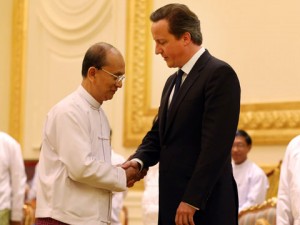EU Ignores Its Burma Sanction Benchmarks
By Today, the EU is likely to lift most of the remaining sanctions on Burma allowing a glut of investment by European companies, despite the benchmarks set out last year not being met. In April last year, the EU suspended sanctions for one year and outlined conditions that must be met if they were to be lifted completely. These benchmarks included the unconditional release of political prisoners, an end to armed conflict, recognition of the status of Rohingya, and improved humanitarian access to conflict-affected zones. These conditions are being ignored.
Today, the EU is likely to lift most of the remaining sanctions on Burma allowing a glut of investment by European companies, despite the benchmarks set out last year not being met. In April last year, the EU suspended sanctions for one year and outlined conditions that must be met if they were to be lifted completely. These benchmarks included the unconditional release of political prisoners, an end to armed conflict, recognition of the status of Rohingya, and improved humanitarian access to conflict-affected zones. These conditions are being ignored.
Firstly, there remain over 200 political prisoners in Burma and those who have been released face restrictions, for example, not being issued passports. While there have been some limited steps towards the release of those remaining with the establishment of a review board to determine who is still a political prisoner and thus release them, this review board has so far lacked any substance. Furthermore, as pointed out by the Special Rapporteur for the situation of human rights in Burma, Tomás Ojea Quintana, Rohingya prisoners in Arakan State are being tortured and left out of the review board’s list of political prisoners.
Secondly, the armed conflict in Kachin State has become considerably worse since April of last year. A major Burma Army offensive since Christmas has compounded the terrible humanitarian situation in northern Burma. Helicopters and jets dropping shells that kill innocent Kachin civilians and the arbitrary arrest and torture of suspected Kachin soldiers do not represent progress in ending armed conflict. In recent weeks, there have also been more Burma Army attacks on the Shan State Army – North in Shan State.
Thirdly, the welfare of Rohingyas has seriously deteriorated. Two bouts of violence in Arakan State last year have left around 125,000 refugees, mostly Rohingyas. The government’s commission to investigate the violence does not include any Rohingyas while protection for people in Arakan State, for both Rohingya Muslims and Arakan Buddhists, is inadequate.
The fourth benchmark is improved humanitarian access for those in need. For those displaced by the violence in Arakan State, the living conditions in the refugee camps are awful. As Valerie Amos, the UN Under-Secretary General for Humanitarian Affairs and Emergency Relief Coordinator, said after a visit in December, “I saw thousands of people in overcrowded, sub-standard shelter with poor sanitation. They don’t have jobs, children are not in school and they can’t leave the camp because their movement is restricted.” In Kachin State, the government routinely delays or blocks humanitarian access to Internally Displaced Persons camps.
Last year, the suspension of sanctions was an acknowledgment that there were dangers of backsliding. “Those changes are not yet irreversible, which is why it is right to suspend rather than lift sanctions for good,” said UK Prime Minister, David Cameron, at the time. The premature lifting of sanctions by the EU gives the signal to the Burma government that it doesn’t really matter what is happening in the country, as they will always be rewarded. As Eva Kusuma Sundari, President of the ASEAN Inter-Parliamentary Myanmar Caucus and an Indonesian Member of Parliament succinctly summarises, “Permanently lifting EU sanctions now would be sending the wrong message.” The United Nationalities Federal Council (UNFC), an alliance of non-state armed groups, also warns of the dangers of lifting the sanctions prematurely, “If the EU chooses to remove all sanctions, it will reduce its ability to work to promote, peace, democracy, and human rights in Burma.”
At a recent township administrative office meeting in Rangoon Region, it was announced that EU countries are planning to invest in the Thilawa Special Economic Zone just outside of Rangoon. It is evident that investment is where the EU’s priorities lie, and the regional grouping is all too willing to lavish praise on “the remarkable process of reform” that has left hundreds of thousands displaced without satisfactory access to humanitarian aid, left political prisoners behind bars, failed to protect civilians and even been complicit in the violence against one of the most vulnerable groups in Burma, and escalated devastating military offensives in northern Burma. It is of serious concern that the EU’s principles and policies on human rights are taking a back seat in favor of business interests. The EU should put its own standards, best practices, and obligations on human rights at the forefront of its policy towards Burma.
Tags: Burma Partnership, European Union, SanctionsThis post is in: Blog
Related PostsBurma Partnership Celebrates Continuing Regional Solidarity for Burma and Embraces the Work Ahead for Progressive Voice
Burma Army Displays Blatant Disregard for 21st Century Panglong Peace Process
Ann Din Coal Power Plant: Local Movement and Action to Preserve and Protect Natural Resources and Land: Mon IDP Report Case Study #4
Latest Human Rights Abuse Case Demonstrates Urgent Need to Reform the Myanmar National Human Rights Commission
Human Rights Far From Guaranteed as US Sanctions on Burma Are Removed









 All posts
All posts